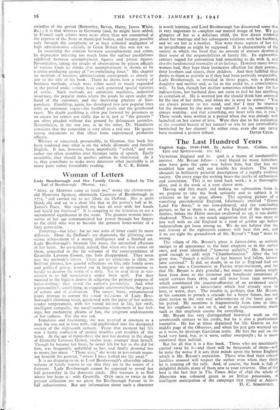The Last Hundred Years
English Saga, 1840-1940. By Arthur Bryant. (Collins, with Eyre and Spottiswoode. ms. 6d.) VicrogIAN England and its quel is a theme of inexhaustible interest. Mr. Bryant follows a trail blazed by many historians who have gone the same way before him, but that has not troubled him and will not trouble his readers. The book abounds in brilliantly pictorial descriptions of a rapidly evolving society. On every page the writing bears the marks of enthusiasm and conviction. This is no tired hack work ; it is thoroughly alive, and .is the work of a very clever man. Having said this much and making no subtraction from it, we propose to take the book seriously and to subject it to criticism so far as space allows. The opening picture of a vanishing pre-industrial England, felicitously entitled " Green Land Far Away," is too rose-coloured, and the concluding picture, so far as there is one, of the England of the nineteen. thirties, before the Hitler menace swallowed us up, is too darkly shadowed. There is too much suggestion that all was more or less well with an old England in a kind of golden age before industrialism got loose among us. We do not believe that the real history of the eighteenth century will bear this out, and if we are right the groundwork of Mr. Bryant's " Saga " must be wrong. The villain of Mr. Bryant's piece is laissez-faire, as actively malign to all appearance in the later chapters as in the earlier ones, and even identified (" however unfairly," Mr. Bryant is good enough to add) with " Chamberlainism." After the last great war, " though a million of her bravest had fallen, laissez- faire survived." It did, no doubt, in so far as England had not been put into a Communist or Fascist, strait-waistcoat, and for that Mr. Bryant is duly grateful ; but much more justice might have been done to the immense and beneficent extensions of social services from 1870, and still more from 1900 onwards, which constituted the counter-offensive of an awakened social conscience against a laissez-faire which had already seen its best, or worst, days. The trouble is, perhaps, that Mr. Bryant, in his concern to preach a crusade for a better future, has not done justice to the very real achievements of the latter part of his period. He mentions it fragmentarily from time to time, but his emphasis is not on it, and in an impressionistic study such as this emphasis counts for everything. Mr. Bryant has very distinguished historical work on the seventeenth century to his credit, but he is also a professional journalist. He has at times deputised for Mr. Garvin on the middle page of the Observer, and when his pen gets warmed up, as it were, he develops Garvinian traits. He hits the nail on the head very hard, but, as it were, rather sweepingly ; he is more emotional than judicial.
But for all that it is a fine book. Those who are uncritically carried away by it—and there will be thousands of them—will be none the worse if it sets their minds upon the better England which is Mr. Bryant's aspiration. Those who find their critical faculties aroused will respect the author even when they think he is running off the rails. And, of course, the book is full of delightful details, many of them new to your reviewer. One of the best is the fact that in The Times Atlas of 1896 the whole of Abyssinia was coloured green as an Italian possession, in intelligent anticipation of the campaign that ended at Adowa.
D. C. SOMERVELL.






























 Previous page
Previous page